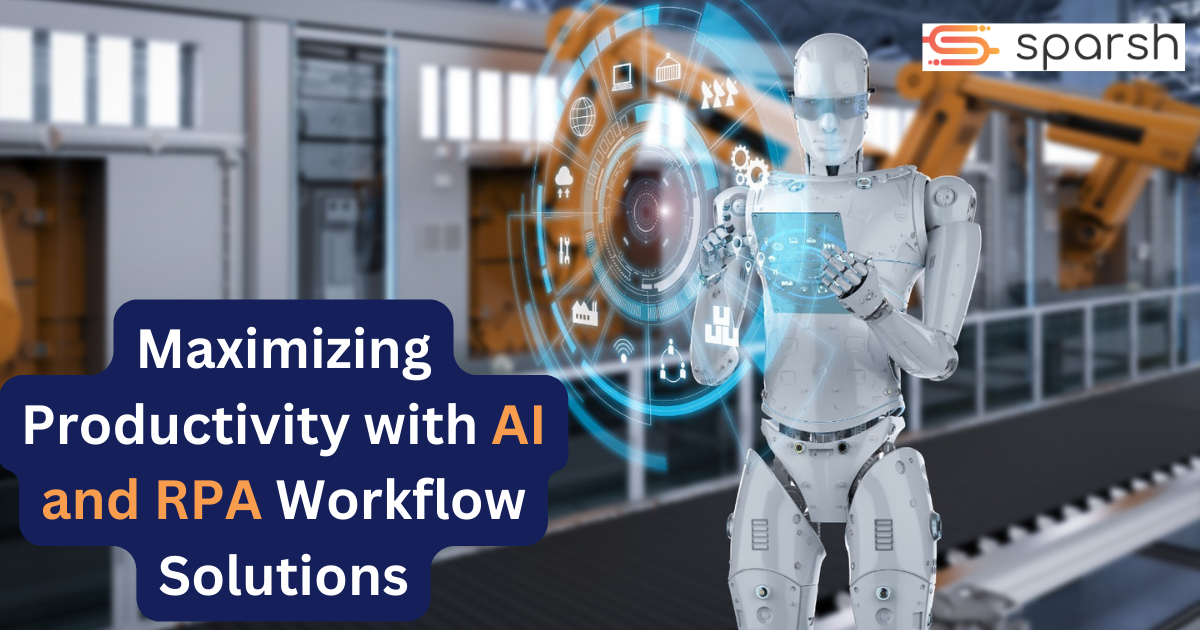Maximizing Productivity with AI and RPA Workflow Solutions

What is AI Workflow Automation?
AI workflow automation involves the integration of artificial intelligence (AI) into the automation of business processes. This advanced form of automation leverages AI’s cognitive abilities, such as machine learning, natural language processing, and data analytics, to perform tasks that typically require human intelligence. AI workflow automation goes beyond traditional automation by enabling systems to learn, adapt, and improve over time, resulting in more efficient and intelligent processes.
Designing RPA Solutions for Workflow Process
Designing effective RPA solutions for workflow processes involves several key steps:
- Process Identification: Identify the processes that are best suited for automation. Usually, these are simple rule-based, repetitive tasks that do not need much human input.
- Mapping Workflows: Create detailed maps of the workflows to understand each step and identify potential bottlenecks or inefficiencies.
- Selecting the Right RPA Tools: Choose the appropriate RPA software that aligns with the specific needs of your business. Leading providers like Microsoft RPA and Automation Anywhere offer robust tools for various automation requirements.
- Developing and Testing Bots: Develop RPA bots to automate the identified tasks and test them thoroughly to ensure they perform as expected.
- Execution and Tracking: Put the RPA solutions into practice and track their effectiveness over time to find areas that need improvement.
How Do RPA and Workflow Automation Work Together?
RPA and workflow automation complement each other by automating different aspects of business processes:
- RPA: Robotic Process Automation handles repetitive, rule-based tasks by mimicking human actions. It is ideal for automating tasks like data entry, invoice processing, and customer support.
- Workflow Automation: Workflow automation focuses on streamlining the flow of tasks and information across different systems and departments. It ensures that tasks are completed in a logical sequence and that all necessary approvals and actions are taken.
By integrating RPA with workflow automation, businesses can achieve end-to-end automation of complex processes, leading to increased efficiency and reduced operational costs.
Benefits of RPA for Workflow Processes
RPA offers numerous benefits for workflow processes, including:
- Increased Efficiency: RPA automations work 24/7, speeding up processes and ensuring consistent output.
- Cost Savings: By reducing the need for manual labor, RPA significantly lowers operational costs.
- Accuracy: RPA tools eliminate human errors, leading to more accurate and reliable outcomes.
- Scalability: RPA solutions can easily scale to handle increased workloads without additional resources.
- Enhanced Data Management: RPA software can manage and analyze large volumes of data, providing valuable insights for decision-making.
Exploring Automation Platforms Services and Capabilities
Leading RPA platforms like Microsoft RPA and Automation Anywhere offer a wide range of services and capabilities:
- Bot Development and Deployment: Tools to create and deploy bots quickly and efficiently.
- Integration: Smooth integration with current programs and systems.
- Analytics and Reporting: Advanced analytics and reporting features to monitor and optimize bot performance.
- Security: Comprehensive security procedures to safeguard private information and guarantee legal compliance.
How RPA Enhances Performance
RPA enhances performance by:
- Streamlining Operations: Automating routine tasks frees up human resources to focus on higher-value activities.
- Increasing Accuracy: Bots carry out jobs with extreme accuracy, which lowers errors and raises output quality.
- Reducing Turnaround Times: Faster processing times lead to quicker turnaround times for tasks and projects.
- Enhancing Compliance: RPA ensures that tasks are performed according to regulatory requirements, reducing the risk of non-compliance.
Industry Statistics on Automation
Industry statistics highlight the growing importance of automation:
- Adoption Rates: According to Gartner, the adoption of RPA is expected to reach 90% among large organizations by 2024.
- Cost Savings: McKinsey estimates that RPA can reduce operational costs by up to 30%.
- Productivity Gains: A study by Forrester Research found that businesses implementing RPA saw productivity gains of up to 50%.
Key Factors to Consider When Choosing an RPA Solution
When selecting an RPA solution, consider the following factors:
- Scalability: Ensure the solution can scale to meet your business’s growing needs.
- Ease of Use: Choose a platform that is user-friendly and requires minimal coding knowledge.
- Integration Capabilities: The solution should integrate seamlessly with your existing systems and applications.
- Support and Training: Look for providers that offer robust support and training resources.
- Security: Verify that the platform protects your data with robust security measures.
Challenges and Considerations with AI Workflow Automation
Automation of AI workflows has numerous advantages, but there are drawbacks as well.
- Complexity: Implementing AI-powered RPA can be complex and requires a thorough understanding of the technology.
- Change Management: Employees may resist changes brought about by automation. Effective change management strategies are essential.
- Data Quality: AI can only be successful with high-quality data. Inaccurate findings may arise from poor data quality.
- Cost: Initial implementation costs can be high, although the long-term benefits often outweigh these costs.
Conclusion
Maximizing productivity with AI and RPA workflow solutions is a transformative strategy for modern businesses. By leveraging advanced automation tools, organizations can streamline operations, reduce costs, and enhance overall efficiency. As technology continues to evolve, the integration of AI and RPA will become increasingly essential for maintaining a competitive edge. With strong RPA solutions, you can embrace automation’s future and reach new heights of creativity and productivity.
Call to Action:
Ready to maximize your productivity with AI and RPA workflow solutions? Get in touch with Sparsh Communications right now to find out how our state-of-the-art automation services can revolutionize the way your company operates. Join us in embracing the era of efficiency and innovation.









